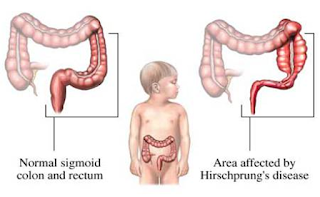Hirschsprung's Disease Symptoms And Treatment
Hirschsprung’s disease is a condition that affects the large intestine (Colon) and cause problem with passing stool.
The condition is present at birth (congenital) as result of missing nerve cells in the muscles of the baby’s colon.
In mild cases, the conditions might not be detect until later in childhood.
Uncommon, Hirschsprung’s disease is first diagnosed in adults.
Surgery to bypass or remove the disease part of the colon is treatment.
Hirschsprung's Disease Symptoms
Signs and symptoms of Hirschsprung’s disease vary with the severity of the condition .
Usually signs and symptoms appear shortly after birth but something they’re not until later in life.
The most obvious sign is a newborn’s failure to have typical a bowel movement within 48 hours after birth.
Other signs and symptoms in newborns may include.
· Swollen belly
· A green or brown substance including Vomiting
· Gas which might make a newborn fussy or constipation
· Diarrhea
· Chronic constipation
· Gas
· Failure to thrive
· Fatigue
Hirschsprung's Disease Causes
It’s not clear what causes Hirschsprung’s disease. It something occurs in families and might in some cases is associate with a genetic mutation.
Hirschsprung’s disease occurs when nerve cells in the colon don’t form completely.
Nerves in the colon control the muscle contractions that move food through the bowels. Without the contractions,
Stool stays in the large intestine.
Risk factors
Factors that may increase the risk of Hirschsprung’s disease include:
Having a sibling who has Hirschsprung’s disease:
The Condition future biological children could can be inherit if you have one child who has the be
Being male: Hirschsprung’s disease is more common in males .
Having other inherited conditions. Has Hirschsprung’s disease is associate with certain inherited condition.
Such as Down syndrome and other abnormalities present a birth such as congenital heart disease
Complication
Children who have has Hirschsprung’s disease are prone to a serious intestinal infection called enter -colitis.
Enterocolitis can be life-threatening. It’s treated in the hospital with colon clearing and antibiotics.
Hirschsprung's Disease Treatment
Surgery to bypass the part of the colon that has no nerve cells treats Hirschsprung’s disease.
The lining of the diseased part of the colon is strippe away, and normal colon is pull through the form the inside and attached to the anus.
This is usually done using minimal invasive (laparoscopic) methods, operating thought the anus.
In children who are very surgery might b done in two steps.
First the abnormal porting of the colon is remove and the top, health of the colon is connect to opening the surgery creates in the child’s abdomen.
This allows time for the lower part of the colon to heal.
Ileostomy. The doctor removes the entire colon and connects the small intestine to the stoma into a bag.
Colostomy. The doctor leaves part of the colon intact and connects it to the stoma.
The body through the end of the large intestine stool.
Result of surgery
After surgery most children pass stools normal although some may have diarrhea at first.
Toilet training may take longer because children have to learn how to coordinates the muscles used to pass stool.
Long term it’s possible to have continued constipation, a swollen by and leaking of stool (soiling ).
Children continue to be at risk of development a bowel infection after surgery especially in the first year.
Be aware of signs and symptoms of enterocolitis and call the doctor immediately if any of these occur.
1. Bleeding from the rectum
2. Diarrhea
3. Fever
4. Swollen abdomen
5. Vomiting
Thank you reading our article, Hope you like it you can also read
causes bloating in stomach
Thank you reading our article, Hope you like it you can also read
causes bloating in stomach




